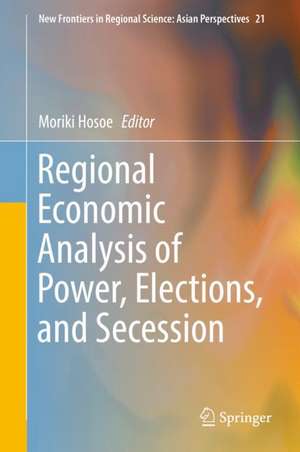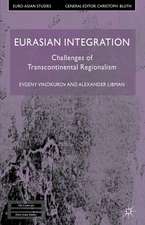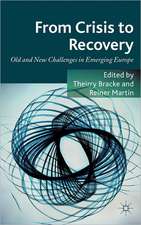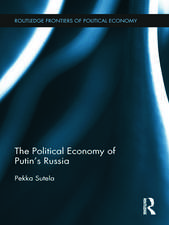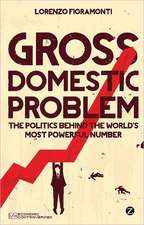Regional Economic Analysis of Power, Elections, and Secession: New Frontiers in Regional Science: Asian Perspectives, cartea 21
Editat de Moriki Hosoeen Limba Engleză Hardback – 9 feb 2018
| Toate formatele și edițiile | Preț | Express |
|---|---|---|
| Paperback (1) | 472.66 lei 39-44 zile | |
| Springer – 7 iun 2019 | 472.66 lei 39-44 zile | |
| Hardback (1) | 728.74 lei 3-5 săpt. | |
| Springer – 9 feb 2018 | 728.74 lei 3-5 săpt. |
Din seria New Frontiers in Regional Science: Asian Perspectives
-
 Preț: 594.16 lei
Preț: 594.16 lei - 15%
 Preț: 652.64 lei
Preț: 652.64 lei - 18%
 Preț: 742.00 lei
Preț: 742.00 lei - 15%
 Preț: 645.96 lei
Preț: 645.96 lei - 18%
 Preț: 798.18 lei
Preț: 798.18 lei - 18%
 Preț: 724.14 lei
Preț: 724.14 lei - 18%
 Preț: 733.33 lei
Preț: 733.33 lei - 15%
 Preț: 693.25 lei
Preț: 693.25 lei - 15%
 Preț: 640.06 lei
Preț: 640.06 lei - 15%
 Preț: 702.87 lei
Preț: 702.87 lei - 15%
 Preț: 718.61 lei
Preț: 718.61 lei - 18%
 Preț: 786.36 lei
Preț: 786.36 lei - 18%
 Preț: 1110.72 lei
Preț: 1110.72 lei - 15%
 Preț: 644.18 lei
Preț: 644.18 lei - 15%
 Preț: 699.45 lei
Preț: 699.45 lei - 15%
 Preț: 643.34 lei
Preț: 643.34 lei -
 Preț: 395.25 lei
Preț: 395.25 lei - 18%
 Preț: 892.42 lei
Preț: 892.42 lei -
 Preț: 386.39 lei
Preț: 386.39 lei - 24%
 Preț: 594.42 lei
Preț: 594.42 lei - 18%
 Preț: 900.31 lei
Preț: 900.31 lei - 15%
 Preț: 714.02 lei
Preț: 714.02 lei - 15%
 Preț: 698.62 lei
Preț: 698.62 lei - 24%
 Preț: 632.78 lei
Preț: 632.78 lei - 18%
 Preț: 1244.59 lei
Preț: 1244.59 lei - 15%
 Preț: 644.63 lei
Preț: 644.63 lei - 18%
 Preț: 785.42 lei
Preț: 785.42 lei - 15%
 Preț: 639.73 lei
Preț: 639.73 lei -
 Preț: 357.81 lei
Preț: 357.81 lei - 18%
 Preț: 1111.53 lei
Preț: 1111.53 lei - 18%
 Preț: 721.33 lei
Preț: 721.33 lei - 15%
 Preț: 698.15 lei
Preț: 698.15 lei
Preț: 728.74 lei
Preț vechi: 888.71 lei
-18% Nou
Puncte Express: 1093
Preț estimativ în valută:
139.47€ • 144.37$ • 117.88£
139.47€ • 144.37$ • 117.88£
Carte disponibilă
Livrare economică 13-27 februarie
Preluare comenzi: 021 569.72.76
Specificații
ISBN-13: 9784431558958
ISBN-10: 4431558950
Pagini: 200
Ilustrații: VII, 194 p. 33 illus., 4 illus. in color.
Dimensiuni: 155 x 235 mm
Greutate: 0.48 kg
Ediția:1st ed. 2018
Editura: Springer
Colecția Springer
Seria New Frontiers in Regional Science: Asian Perspectives
Locul publicării:Tokyo, Japan
ISBN-10: 4431558950
Pagini: 200
Ilustrații: VII, 194 p. 33 illus., 4 illus. in color.
Dimensiuni: 155 x 235 mm
Greutate: 0.48 kg
Ediția:1st ed. 2018
Editura: Springer
Colecția Springer
Seria New Frontiers in Regional Science: Asian Perspectives
Locul publicării:Tokyo, Japan
Public țintă
ResearchCuprins
1. The Issue of Regional Conflict and Secession.-2. Secession, Representative Elections, and Political Governance.-3. Regional Integration and Secession with Rent Seeking.-4. Integration and Secession under Threat of Third Region.-5. Integration, Third Region Effect, and Policy Commitment.-6. Secession and Fiscal Policy.-7. Voting and Secession.-8. Resource Sharing, Civil Conflict, and Secession.-9. Empirical Analyses of Secession and Integration: What Determines National Size?.
Notă biografică
Dr. Moriki Hosoe is designated professor in the Faculty of Economics at Kumamoto Gakuen University, Japan. He earned Bachelor’s degree in Physics and Bachelor’s degree in Economics at Kyushu University, Japan. After that, he earned Ph.D. degree in Economics at Kyushu University, Japan. Then he was a professor in the Faculty of Economics at Kyushu University. After retirement, he was a professor in the Faculty of Economic at Kumamoto Gakuen University. His research field is game theory and public policy. His other research field is law and economics. He serves president of Japan Section of Regional Science Association International and also serves president of Japan Association of Law and Economics.
Dr. Sato is associate professor of Contemporary Social Studies at Nagasaki Wesleyan University, Japan. He completed his Diploma, B.A., M.A. and Ph.D. in Economics at Kyushu University, Japan. He was Research Associate of Economics at Graduate School of Economics at Kyushu University. He teaches Microeconomics, Macroeconomics and Public economics at Nagasaki Wesleyan University. His research has addressed Applied microeconomics especially Public economics, Political economy and Law and economics. Dr. Tadahisa Ohno is an associate professor in the Faculty of Education at Kumamoto University, Japan. He earned a Bachelor’s degree in Economics at Saga University, Japan. After that, he earned a Master’s degree and Ph.D. degree in Economics at Kyushu University, Japan. He was an assistant professor in the Faculty of Economics at Kyushu University. After that, he was a post-doctoral fellow at Research and Education Center of Carbon Resources, Kyushu University. Thereafter he was a post-doctoral fellow at Center for Science, Technology and Innovation Policy Studies, Kyushu University. He has studied Public Economics. Especially, he has been interested in the theoretical studies of intergovernmental competition.
Dr. Takashi KIHARA is professor of Faculty of Economics, at Dokkyo University, Japan. He completed his graduate work at George Washington University in U.S.A. to obtain M.A. in Economics. He earned PhD in Economics from Hokkaido University in Japan. Before joining Dokkyo University, he worked for Ministries of Finance and Foreign affairs as well as Economic Planning Agency of Japanese government in such posts as deputy director, director or director general. He also served Inter-American Development Bank and Asian Development Bank Institute as officer and director, as well as in Nagasaki University and Kyushu University as professor. His research focuses on empirical analyses of development assistance, conflicts, financial structure, and demography. KIHARA has served as executive director of Japan Association of Applied Economics and senior visiting fellow of Policy Research Institute of Ministry of Finance.
Dr. Sato is associate professor of Contemporary Social Studies at Nagasaki Wesleyan University, Japan. He completed his Diploma, B.A., M.A. and Ph.D. in Economics at Kyushu University, Japan. He was Research Associate of Economics at Graduate School of Economics at Kyushu University. He teaches Microeconomics, Macroeconomics and Public economics at Nagasaki Wesleyan University. His research has addressed Applied microeconomics especially Public economics, Political economy and Law and economics. Dr. Tadahisa Ohno is an associate professor in the Faculty of Education at Kumamoto University, Japan. He earned a Bachelor’s degree in Economics at Saga University, Japan. After that, he earned a Master’s degree and Ph.D. degree in Economics at Kyushu University, Japan. He was an assistant professor in the Faculty of Economics at Kyushu University. After that, he was a post-doctoral fellow at Research and Education Center of Carbon Resources, Kyushu University. Thereafter he was a post-doctoral fellow at Center for Science, Technology and Innovation Policy Studies, Kyushu University. He has studied Public Economics. Especially, he has been interested in the theoretical studies of intergovernmental competition.
Dr. Takashi KIHARA is professor of Faculty of Economics, at Dokkyo University, Japan. He completed his graduate work at George Washington University in U.S.A. to obtain M.A. in Economics. He earned PhD in Economics from Hokkaido University in Japan. Before joining Dokkyo University, he worked for Ministries of Finance and Foreign affairs as well as Economic Planning Agency of Japanese government in such posts as deputy director, director or director general. He also served Inter-American Development Bank and Asian Development Bank Institute as officer and director, as well as in Nagasaki University and Kyushu University as professor. His research focuses on empirical analyses of development assistance, conflicts, financial structure, and demography. KIHARA has served as executive director of Japan Association of Applied Economics and senior visiting fellow of Policy Research Institute of Ministry of Finance.
Textul de pe ultima copertă
The main object of this book is to explain some of the mechanisms of integration and secession among regions from the point of view of game theory. To attain this goal, the incentives of regions in a country to unite or to secede and the conditions in the way for the member countries of a federation to leave peacefully are examined. Tensions over secession have become more and more serious, including separatist tensions in China, India, Iraq, Myanmar, and Sri Lanka. Studies included in this book stress differing preferences in the type of policy in each region and the influence of a third region on the power of secession. Decentralization strategies of tax-subsidy policy and governance policy in a political or economic group composed of two regions are shown to be important as a way to avoid wasteful conflict for the secession incentive of a minority region. How those incentives depend on heterogeneity costs associated with different preferences over the type of region and the relativesize of the two regions is shown. Also provided is an analytical framework in which secessions are the equilibrium outcome of explicit civil conflict, where regions with different preferences invest in costly conflict activities. Finally, an empirical analysis is made of determinant factors of secession movements in many regions to verify the validity of our theories of secession. This book is recommended to researchers who are interested in a new economic geography and an interdisciplinary approach for regional economics.
Caracteristici
Clarifies governance structures of policy determination from the point of view of power games Analyzes regional policies of two regions with policy differences under the shadow of secession Investigates analytically and empirically the influences of third regions and the civil conflict cost of the possibility of secession
